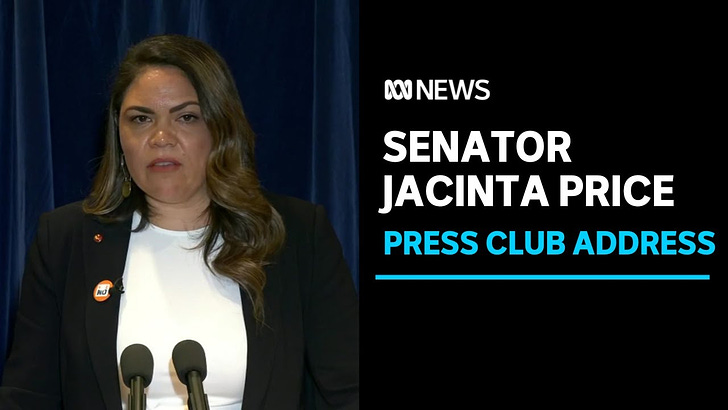Senator Price explains why she'll be voting 'no' to the Voice
<sarcasm> It's because she's the black face of white supremacy </sarcasm>
Senator Jacinta Nampijinpa Price spoke to the National Press Club in Canberra on 14 September 2023, to present the ‘No’ case to the upcoming referendum on an indigenous Voice to parliament.
Senator Price rejects the grievance narrative that positions all problems that beset Aboriginal and Torres Strait Islander people - particularly those living in remote communities - as the bitter fruits of colonisation.
She points out that traditional customs such as arranged marriage of young girls to older men, and belief in sorcery, promote violence (including sexual violence), and that the misattribution of such forms of violence to intergenerational trauma, rather than to the retention of customary beliefs and practices, leaves its victims bereft of justice and relief from their suffering.
Senator Price also highlights the signal failure, over many decades, of the multitude of organisations that have been established to ‘close the gap’ between outcomes of indigenous and non-indigenous Australians. She suggests that such organisations have a perverse incentive not to close that gap, because doing so would remove their raison d'etre.
She calls on all Australians to focus their efforts on alleviating the plight of the most marginalised in our society, irrespective of their racial group or identity.
Whether you’ve already decided to vote no, or you’re planning to vote yes because you believe that indigenous Australians deserve both constitutional recognition and support to realise their full potential, I urge you to listen to the words of this remarkable woman. Senator Price is highly intelligent, articulate, and has fully thought through her positions (unlike so many people I’ve spoken to who are planning to vote yes because they have a vague notion that doing so will benefit indigenous Australians in some unspecified way).
Postscript
Many thanks to subscriber Roc for sending me this fascinating article: The extinction of the Australian pygmies. Who knew that Australia had pygmies??????
The article details the extraordinary lengths that ‘establishment’ scientists went to, in the 20th century, to defend the dominant ‘one people’ model of Aboriginal origins against clear contradictory scientific evidence. This ‘one people’ model was then co-opted by activists, for political purposes:
“At the same time, however, a political movement was gathering force that would later swamp the trihybrid thesis and dissuade any converts it had won. In the late 1960s, Aboriginal activists and their white supporters began to build a political movement among all Australian Aboriginal people. Previous attempts to achieve this had failed because Aborigines were divided by geography, culture and, in some places, by language, and few felt they had much in common.
The Sixties movement adopted the anti-imperialist rhetoric then prevalent in southeast Asia and Africa. British colonialism had caused indigenous oppression and dispossession, they argued, so all Aborigines should come together to reject the hegemony of white Australia. Although this was primarily a movement of radical urban blacks trying to create a constituency among dispersed Aborigines in rural areas, the appeal galvanized considerable support, especially among white sympathizers.
Their appeal to pan-Aboriginalism, the notion that all Australian indigenous people had a common political interest, was always dependent on the idea that they were one people. (The only exception allowed was that of the Torres Strait Islanders, who were later defined as a separate entity.) Their politics were based on the claim that they were the original owners of the continent who had been dispossessed by the British. They did not want to allow there might be a hierarchy of claims for arrival, and thus ownership, among Aborigines themselves. So anyone who argued against the “one people” thesis would be seen as betraying the pan-Aboriginal movement and undermining Aboriginal political aspirations.
Moreover, the moral appeal of the activists’ case would have been weakened by the notion that there had been several waves of Aboriginal migrants, each of whom had violently dispossessed the other. Rather than a story of aggressive white imperialists disrupting an arcadian Aboriginal people living in harmony with one another and their environment, the long term history of Australian habitation would have resembled more that of humanity at large where the stronger have pushed aside the weaker, irrespective of the colour of either side. Hence, instead of a simple moral tale of goodies and baddies, the history of this continent would have reflected more the hard reality of the human condition everywhere.
For the past thirty years, there have been few in mainstream political or intellectual life with the stomach to make these points. As a result, the activists’ case about Aboriginal origins has been accepted, largely without dissent. Few authors, and certainly none writing for schoolchildren, have dared to even suggest that Aborigines had anything but one common source. This is why today the educated but non-specialist public has no inkling that there were ever pygmies in Australia. Knowledge of their existence would pose an obvious question mark over the central doctrine of Aboriginal politics. Hence, for public consumption, politics have made the topic taboo.”
Now, where have we heard this story of the politicisation of science before????




I got a good laugh out of this (especially the last 10 seconds)
https://open.substack.com/pub/australiasmostunemployablebloke/p/welcome-to-country-the-extended-version?r=9wy0f&utm_campaign=post&utm_medium=web
What a brilliant speech. What a courageous, dignified, truthful lady, who really does have the best interests of all Australian citizens at heart - especially the truly voiceless. If all politicians had her qualities, the world would be in a much better state.